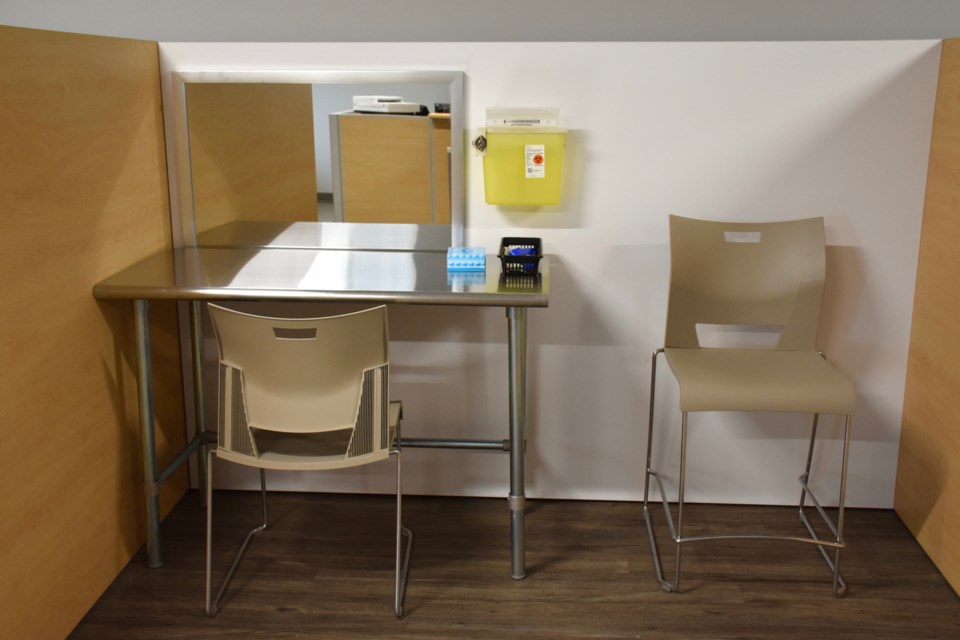As a physician, Dr. Julie Samson is trained to save lives and help people.
"Everyone's life is worth saving. We do not get to choose whose life we get to save. I ask the provincial government, why do you?" she questioned today.
Samson is the co-medical director at Safe Health Site Timmins (SHST), the city's first safe consumption site that is one of two facilities operating in northeastern Ontario. She was one of the speakers at a Canadian Drug Policy Coalition (CDPC) event today highlighting the urgent need for provincial funding.
Without provincial cash, SHST will close on March 31. It's been open since July 2022.
SEE: Timmins safe consumption site set to close at end of March
CDPC has sent an open letter to Ontario's Minister of Health Sylvia Jones and Associate Minister of Mental Health and Addictions Michael Tibollo. It has eight calls to action, including emergency funding for safe consumption sites that have applied for provincial cash and are going to close or have closed due to lack of funds.
The letter is signed by Samson, with endorsement from local groups DIY Community Health Timmins, Timmins and Area Women in Crisis, Mayor Michelle Boileau, and Cochrane District Paramedic Services.
For its first 1.5 years in operation — from July 2022 to December 2023 — SHST was funded exclusively by the City of Timmins. Hoping to bridge the gap between the municipal cash and provincial funding approval, Timmins and District Hospital committed to fund it from Jan. 1, 2024, to March 31.
In the first three quarters of 2023, the Ontario coroner's data shows Timmins had the fifth-highest mortality rate in the province with 16 opioid toxicity deaths, or 50.7 deaths per 100,000 people. This number is for Timmins specifically and not the entire Porcupine Health Unit area, which saw a total of 23 deaths during the first three quarters. Thunder Bay had the highest rate, with 74.4 deaths per 100,000 people, followed by North Bay, Peterborough and Sudbury.
In all of Ontario during that time, the provincial rate was 17.5 deaths per 100,000 population — or a total of 1,947 opioid toxicity deaths.
It will be devastating if SHST closes, said Samson.
"The risks associated with the closure of this site are significant and have the potential to negatively impact our entire community. There will be an increase in death. Our site has managed 361 overdoses since its opening, 36 per cent required administration of Naloxone, which could have resulted in fatalities," Samson said.
If it closes, Samson warns there will be an increase in paramedic calls and increased response times for non-drug-related emergencies. In the emergency department, she said to expect an increase in the number of people with opioid-related overdoses contributing to longer wait times.
Safe consumption sites are places for people to use previously obtained drugs in the presence of trained medical staff and connect to services.
SHST Timmins is operated by the hospital right now and once there is a permanent funding stream it will be operated by the Canadian Mental Health Association Cochrane-Timiskaming.
Last year, SHST received approval for a permanent facility from Health Canada, which allowed it to apply to the province for funding.
Right after receiving the federal nod, Ontario paused all new funding applications for safe consumption sites to allow for a review of the facilities after a woman was hit by a stray bullet and killed outside of a Toronto site. That review has not been completed yet.
Down Highway 144, Sudbury's safe consumption site known as The Spot is also slated to close in March.
Sudbury's facility is operated by the Réseau ACCESS Network. Its application for provincial funding was submitted in August 2021, with the province not coming through with funding yet.
In recent months, it's been kept open through corporate and anonymous donations. Its last day of operation will be March 29 if provincial cash doesn't come through.
